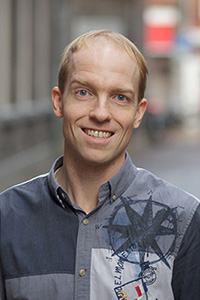Martijn Wieling: new professor by special appointment of Low Saxon/Groningen Language and Culture

On 1 July 2018, Dr Martijn Wieling was appointed professor by special appointment of Low Saxon / Groningen Language and Culture. Wieling, born in Emmen in 1981, is also an associate professor in Information Science at the University of Groningen. In this new role, he will be devoting one day a week to researching Low Saxon in general, and the variants of Low Saxon spoken in Groningen in particular. The appointment is for four years initially, based at the new Centre for Groningen Language and Culture (CGLC) at the Faculty of Arts, to which Jan Glas, Theo de Groot, Henk Scholte, Patricia Ottay and Goffe Jensma are also affiliated.
Wieling will be getting involved in two large-scale projects currently being developed at this expertise centre: the creation of ‘Woordwaark’, a language database of oral and written utterances in Gronings (supervised by Professor Goffe Jensma) and the citizen science project ‘Stemmen van Groningen’, supervised by Dr Nanna Hilton, the purpose of which is to gather and document variations in pronunciation among speakers of Gronings.
Wieling received his PhD from the University of Groningen in 2012. He was awarded the cum laude distinction for his thesis about the quantitative analysis of dialect variation. He went on to research differences in the movement of the tongue and lips when local dialects are being spoken. One possible explanation for the subtle variations that occur in language may lie in how speakers are accustomed to positioning their tongue and lips. He observed, for example, that young dialect speakers from Ter Apel (province of Groningen) position their tongue further back in their mouth than speakers from Ubbergen (province of Gelderland). Wieling published the results of this research project not only in scientific articles but also in the form of a comic.
Research themes
As an expert in quantitative linguistic variation, Wieling will start by investigating the similarities and differences between the language variants in Low Saxon, with a particular focus on the Groningen language area. The CGLC digital data collections will, of course, be a valuable resource. Wieling’s second central research theme is the influence of regional bilingualism on the health of dialect speakers. There is evidence to suggest, for example, that speakers of two languages develop dementia at a later age than speakers of one language, but to what extent this benefit also applies to regional multilingualism is unknown. In his quest to find answers to this question, Martijn Wieling hopes to link up with the LifeLines project being run by the UMCG. Within this project, 167,000 inhabitants of the northern provinces of the Netherlands from three generations are to be monitored over a minimum period of 30 years to gain insight into a range of lifestyle and health-related issues.
Acquisition and dissemination
A third important theme within Wieling’s research is the changes that take place in the use of local dialects and how they are disseminated. Many of Wieling’s generation are not native speakers of the local dialect. Most of the parents of Wieling’s generation were raised speaking the dialect and / or spoke it among themselves, but for a wide variety of reasons, many of them switched to Dutch when communicating with their children. As well as working on more precise statistical documentation of the use of the dialect, Wieling wants to collaborate with the CGLC staff on the development of digital tools that can be used to foster the acquisition of Gronings and other Low Saxon dialects.
| Last modified: | 04 February 2022 10.19 a.m. |
More news
-
06 May 2024
Impact: Utilization of geospatial data within international development cooperation
One of students nominated for the Ben Feringa Impact Award 2024 is Jonas Göbel. Göbel is nominated because of his internship research around the utilization of geospatial data in the field of international development cooperation.
-
03 May 2024
NWO Impact Explorer for Suzanne Manizza-Roszak's impactful postcolonial literary research
Suzanne Manizza-Roszak, Assistent Professor English at the Faculty of Arts has received an Impact Explorer grant from the Dutch Research Council (NWO) for her postcolonial literary research and the project to translate the results into social...
-
29 April 2024
Learning to communicate in the operating theatre
The aios operates, the surgeon has the role of supervisor. Three cameras record what happens, aiming to unravel the mechanisms of 'workplace learning'.
